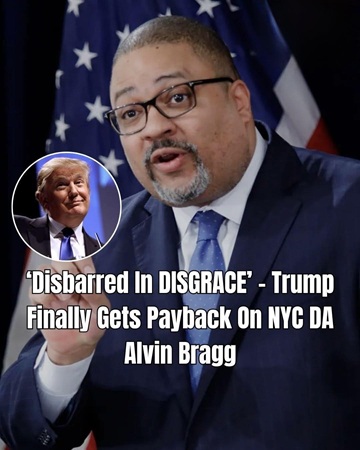
Manhattan District Attorney Alvin Bragg — the same prosecutor who has been criticized by some for allegedly turning a blind eye to violent assaults while aggressively pursuing individuals who defend themselves — devoted more than a year and millions of taxpayer dollars to pursuing Donald Trump, who at the time was a private citizen and former president of the United States.
Bragg’s legal campaign against Trump centered on thirty-four felony charges of “falsifying business records.”
From the beginning, legal experts across the political spectrum questioned the strength and legitimacy of these charges, describing them as a stretch and, in some cases, an unprecedented use of prosecutorial discretion.
Critics argued that the case was politically motivated, a claim that has been reinforced by the extensive media coverage and the timing of the prosecution in relation to Trump’s political career.
Despite these questions, Bragg ultimately secured convictions, demonstrating the reach and intensity of New York’s prosecutorial system, particularly in Manhattan, a city often described as the epicenter of political drama and media spectacle.
The case has been characterized by many as emblematic of the increasing politicization of the justice system, raising concerns about whether prosecutorial powers are being used to target political opponents rather than uphold impartial justice.
In response, Donald Trump filed an appeal late Monday night with New York’s Appellate Division, demanding that his conviction be overturned.
The appeal was described by his legal team as “the most politically charged prosecution in our Nation’s history.”
The filing, which spans 111 pages — though some reports list it at 96 pages — details extensive arguments challenging the legality and fairness of the case.
Trump’s lawyers have referred to Bragg’s actions as “Radical Democrat Lawfare,” framing the prosecution as an overtly political effort rather than a legitimate legal pursuit.
According to a spokesperson for Trump’s legal team, the appeal represents a decisive effort to end what they describe as the weaponization of the legal system, asserting that political motivations should never dictate legal outcomes.
“The Supreme Court’s historic decision on Presidential Immunity, along with established protections under the Federal and New York State Constitutions, as well as long-standing legal precedent, demand that this baseless case be immediately overturned and dismissed,” the spokesperson emphasized.
The filing asserts that the prosecution violates fundamental principles of due process and that the charges were inflated beyond legal norms to achieve a politically motivated result.
The legal team also stressed that Trump remains committed to resisting what they perceive as partisan attacks on his personal and professional reputation, presenting the case as part of his broader mission to Make America Great Again.
GOP Representative Claudia Tenney of New York’s 24th District publicly endorsed this view, describing Trump’s legal team’s assessment as accurate and fair.
From the outset, Bragg’s case appeared fragile. It focused on payments made to a former adult film actress, which Trump’s opponents labeled as “hush money.”
While the circumstances surrounding these payments were sensational and attracted significant media attention, they are not inherently illegal.
In corporate and political contexts, similar transactions are often standard practice and are frequently protected under nondisclosure agreements (NDAs).
Despite this, Bragg sought to frame the payments as criminal acts, arguing that they violated New York’s statute on falsifying business records. Typically, violations of this statute are considered misdemeanors.
However, Bragg contended that because the payments were allegedly made in connection with a second, unspecified crime, they should be elevated to felonies.
Judge Merchan ultimately ruled that Bragg’s prosecutorial approach was legally permissible and determined that jurors did not need to reach a consensus on the alleged second crime in order to convict Trump.
In the aftermath of the conviction, some Democratic officials have accused Trump of “weaponizing” the legal system in his appeals.
However, critics point out that many of these same officials — including New York Attorney General Letitia James, Fulton County D.A. Fani Willis, and Special Counsel Jack Smith — were actively involved in high-profile investigations against Trump over the years, pursuing cases that many viewed as politically motivated.
For instance, Letitia James investigated Trump over allegations involving victimless “crimes,” Fani Willis launched an extensive probe into Trump’s alleged interference in the 2020 election that was later criticized for procedural missteps, and Special Counsel Jack Smith pursued Trump over classified documents and politically sensitive material.
Each of these cases was widely supported by Democratic politicians at the time, suggesting a double standard when it comes to the use of prosecutorial power.
Now that circumstances have shifted and investigations have begun to turn toward those who once championed these aggressive legal actions, the rhetoric has changed dramatically.
Figures such as former National Security Advisor John Bolton, Attorney General Letitia James, and former FBI Director James Comey have expressed concern over what they describe as “abuse of power” and “political retaliation.”
Their previous support for aggressive legal actions against Trump contrasts sharply with their current positions, revealing a pattern in which legal and political standards are applied selectively based on who is in power.
Observers note that this reversal illustrates a broader trend in American politics: when the justice system is used to pursue political opponents, it is framed as legitimate oversight;
when the targets change, the same actions are suddenly condemned as unethical or unlawful.
Critics argue that Bragg and other political figures who aggressively targeted Trump underestimated the potential consequences of their own actions, failing to anticipate that legal and political accountability can move in both directions.
In this context, the lack of sympathy for those who once endorsed politically motivated investigations is notable, as many Americans see the current developments as a reflection of the principle that no one should be above the law — and that the law should never be wielded as a partisan weapon.
Ultimately, the Trump appeal underscores ongoing debates about prosecutorial discretion, political bias in legal proceedings, and the boundaries between legitimate law enforcement and partisan targeting.
While the case continues to unfold, it serves as a high-profile example of the tensions inherent in the intersection of law and politics, raising questions about fairness, precedent, and the role of political motivation in legal decisions.
Manhattan District Attorney Alvin Bragg — the same prosecutor who has been criticized by some for allegedly turning a blind eye to violent assaults while aggressively pursuing individuals who defend themselves — devoted more than a year and millions of taxpayer dollars to pursuing Donald Trump, who at the time was a private citizen and former president of the United States.
Bragg’s legal campaign against Trump centered on thirty-four felony charges of “falsifying business records.”
From the beginning, legal experts across the political spectrum questioned the strength and legitimacy of these charges, describing them as a stretch and, in some cases, an unprecedented use of prosecutorial discretion.
Critics argued that the case was politically motivated, a claim that has been reinforced by the extensive media coverage and the timing of the prosecution in relation to Trump’s political career.
Despite these questions, Bragg ultimately secured convictions, demonstrating the reach and intensity of New York’s prosecutorial system, particularly in Manhattan, a city often described as the epicenter of political drama and media spectacle.
The case has been characterized by many as emblematic of the increasing politicization of the justice system, raising concerns about whether prosecutorial powers are being used to target political opponents rather than uphold impartial justice.
In response, Donald Trump filed an appeal late Monday night with New York’s Appellate Division, demanding that his conviction be overturned.
The appeal was described by his legal team as “the most politically charged prosecution in our Nation’s history.”
The filing, which spans 111 pages — though some reports list it at 96 pages — details extensive arguments challenging the legality and fairness of the case.
Trump’s lawyers have referred to Bragg’s actions as “Radical Democrat Lawfare,” framing the prosecution as an overtly political effort rather than a legitimate legal pursuit.
According to a spokesperson for Trump’s legal team, the appeal represents a decisive effort to end what they describe as the weaponization of the legal system, asserting that political motivations should never dictate legal outcomes.
“The Supreme Court’s historic decision on Presidential Immunity, along with established protections under the Federal and New York State Constitutions, as well as long-standing legal precedent, demand that this baseless case be immediately overturned and dismissed,” the spokesperson emphasized.
The filing asserts that the prosecution violates fundamental principles of due process and that the charges were inflated beyond legal norms to achieve a politically motivated result.
The legal team also stressed that Trump remains committed to resisting what they perceive as partisan attacks on his personal and professional reputation, presenting the case as part of his broader mission to Make America Great Again.
GOP Representative Claudia Tenney of New York’s 24th District publicly endorsed this view, describing Trump’s legal team’s assessment as accurate and fair.
From the outset, Bragg’s case appeared fragile. It focused on payments made to a former adult film actress, which Trump’s opponents labeled as “hush money.”
While the circumstances surrounding these payments were sensational and attracted significant media attention, they are not inherently illegal.
In corporate and political contexts, similar transactions are often standard practice and are frequently protected under nondisclosure agreements (NDAs).
Despite this, Bragg sought to frame the payments as criminal acts, arguing that they violated New York’s statute on falsifying business records. Typically, violations of this statute are considered misdemeanors.
However, Bragg contended that because the payments were allegedly made in connection with a second, unspecified crime, they should be elevated to felonies.
Judge Merchan ultimately ruled that Bragg’s prosecutorial approach was legally permissible and determined that jurors did not need to reach a consensus on the alleged second crime in order to convict Trump.
In the aftermath of the conviction, some Democratic officials have accused Trump of “weaponizing” the legal system in his appeals.
However, critics point out that many of these same officials — including New York Attorney General Letitia James, Fulton County D.A. Fani Willis, and Special Counsel Jack Smith — were actively involved in high-profile investigations against Trump over the years, pursuing cases that many viewed as politically motivated.
For instance, Letitia James investigated Trump over allegations involving victimless “crimes,” Fani Willis launched an extensive probe into Trump’s alleged interference in the 2020 election that was later criticized for procedural missteps, and Special Counsel Jack Smith pursued Trump over classified documents and politically sensitive material.
Each of these cases was widely supported by Democratic politicians at the time, suggesting a double standard when it comes to the use of prosecutorial power.
Now that circumstances have shifted and investigations have begun to turn toward those who once championed these aggressive legal actions, the rhetoric has changed dramatically.
Figures such as former National Security Advisor John Bolton, Attorney General Letitia James, and former FBI Director James Comey have expressed concern over what they describe as “abuse of power” and “political retaliation.”
Their previous support for aggressive legal actions against Trump contrasts sharply with their current positions, revealing a pattern in which legal and political standards are applied selectively based on who is in power.
Observers note that this reversal illustrates a broader trend in American politics: when the justice system is used to pursue political opponents, it is framed as legitimate oversight;
when the targets change, the same actions are suddenly condemned as unethical or unlawful.
Critics argue that Bragg and other political figures who aggressively targeted Trump underestimated the potential consequences of their own actions, failing to anticipate that legal and political accountability can move in both directions.
In this context, the lack of sympathy for those who once endorsed politically motivated investigations is notable, as many Americans see the current developments as a reflection of the principle that no one should be above the law — and that the law should never be wielded as a partisan weapon.
Ultimately, the Trump appeal underscores ongoing debates about prosecutorial discretion, political bias in legal proceedings, and the boundaries between legitimate law enforcement and partisan targeting.
While the case continues to unfold, it serves as a high-profile example of the tensions inherent in the intersection of law and politics, raising questions about fairness, precedent, and the role of political motivation in legal decisions.




